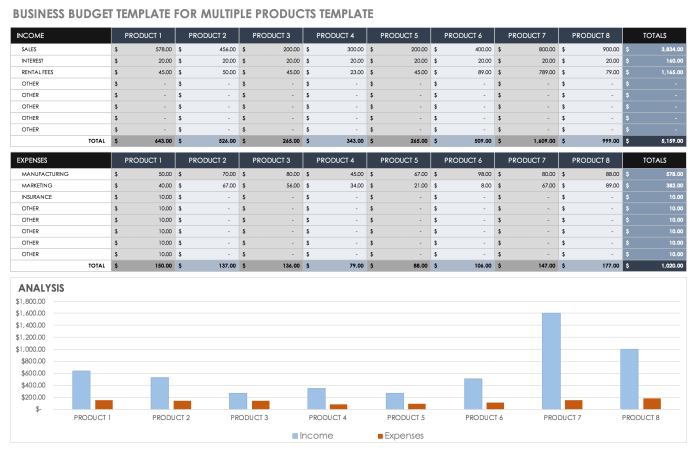Diving into Budgeting for small businesses, this introduction brings a fresh perspective on why budgeting is essential for the success of small businesses. From highlighting the importance of financial planning to exploring different budgeting methods, this topic is sure to resonate with entrepreneurs looking to take their businesses to the next level.
Get ready to uncover the secrets of effective budgeting for small businesses and discover how this financial tool can be a game-changer in the competitive business world.
Importance of Budgeting for Small Businesses
Budgeting is crucial for small businesses as it helps in planning and managing finances effectively. It allows businesses to set financial goals, allocate resources efficiently, and track expenses to ensure profitability and sustainability.
Example of Effective Budgeting
- By creating a budget, small businesses can prioritize spending on essential areas such as marketing, inventory, and employee salaries, while cutting back on unnecessary expenses.
- Having a budget in place can also help small businesses identify potential cash flow issues and take proactive measures to address them before they become critical.
- Effective budgeting can enable small businesses to make informed decisions about investments, expansion opportunities, and pricing strategies based on financial data and projections.
Risks of Not Having a Budget
- Without a budget, small businesses may overspend in certain areas, leading to financial instability and potential cash flow problems.
- The lack of a budget can make it challenging for small businesses to track their financial performance accurately, making it difficult to measure profitability and make adjustments as needed.
- Small businesses without a budget may also struggle to secure funding or loans from financial institutions, as they are unable to demonstrate a clear financial plan and strategy for repayment.
Creating a Budget for Small Businesses

When it comes to creating a budget for a small business, there are several important steps to consider in order to effectively manage finances and plan for the future.
Identifying Revenue Sources
- Determine all sources of revenue, including sales, services, and any other income streams.
- Forecast revenue based on historical data, market trends, and upcoming opportunities.
Estimating Expenses
- List all fixed expenses such as rent, utilities, and salaries.
- Consider variable expenses like marketing, supplies, and equipment maintenance.
Setting Financial Goals
- Establish short-term and long-term financial goals for the business.
- Align budget allocations with these goals to ensure proper resource allocation.
Monitoring and Adjusting
- Regularly monitor actual financial performance against the budget.
- Adjust the budget as needed based on changing circumstances or new opportunities.
Key Components of a Small Business Budget
- Sales Forecast: Predicted sales revenue for the budget period.
- Operating Expenses: Fixed and variable expenses required to run the business.
- Capital Expenditures: Investments in long-term assets like equipment or property.
Different Budgeting Methods
- Incremental Budgeting: Adjusting the previous budget based on changes or growth.
- Zero-Based Budgeting: Building the budget from scratch each period, justifying every expense.
- Activity-Based Budgeting: Allocating resources based on the activities that drive costs.
Monitoring and Adjusting Budgets
Monitoring and adjusting budgets are crucial for the success of a small business. By keeping a close eye on expenses and income, businesses can make informed decisions to ensure financial stability and growth.
Importance of Monitoring a Budget
Monitoring a budget allows small businesses to track their financial health and identify any areas where expenses are exceeding projections. By regularly reviewing the budget, businesses can make timely adjustments to prevent overspending and ensure that they are on track to meet their financial goals.
Strategies for Tracking Expenses and Income
- Use accounting software to keep detailed records of all expenses and income.
- Regularly review financial statements to identify any discrepancies or areas of concern.
- Track expenses by category to understand where the money is being spent and identify potential areas for cost-saving.
- Compare budgeted expenses to actual expenses to pinpoint any variances and make necessary adjustments.
Adjusting Budgets in Response to Financial Changes
- Assess the impact of financial changes, such as a decrease in sales or unexpected expenses, on the budget.
- Identify areas where expenses can be reduced or reallocated to stay within budget constraints.
- Consider renegotiating contracts or seeking out more cost-effective solutions to save money.
- Regularly revisit and update the budget to reflect any changes in the financial landscape.
Tools and Software for Budgeting
When it comes to budgeting for small businesses, having the right tools and software can make a huge difference in managing finances effectively. There are several popular options available that cater specifically to the needs of small businesses.
Popular Budgeting Tools and Software
Here are some of the popular budgeting tools and software that small businesses can consider:
- QuickBooks: QuickBooks is a widely-used accounting software that offers budgeting features along with other financial management tools. It allows businesses to track income and expenses, create budgets, and generate financial reports.
- Wave: Wave is a free accounting software that includes budgeting tools. It is known for its user-friendly interface and can be a great option for small businesses on a tight budget.
- Zoho Books: Zoho Books is another accounting software that offers budgeting features. It allows businesses to create budgets, track expenses, and manage cash flow effectively.
- FreshBooks: FreshBooks is a cloud-based accounting software that also includes budgeting tools. It is known for its invoicing and time-tracking features, making it a comprehensive solution for small businesses.
Comparison and Recommendations
When comparing budgeting tools and software for small businesses, it’s important to consider factors such as ease of use, features, pricing, and scalability. Based on these factors, QuickBooks and Zoho Books are recommended options for small businesses looking to invest in budgeting tools. QuickBooks offers a wide range of features and integrations, while Zoho Books provides a user-friendly interface and affordable pricing plans.
